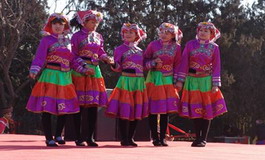
A personal story about Chinese culture
In the trade-business terrain, many Chinese see business and culture as intertwined; each one mutually influences the other. The Sino-Nigeria cultural relations have spanned more than four decades. China's cultural influence on the Nigerian social landscape has been distinctive and overwhelming. The strong cultural bond has guaranteed the expansion of the business horizon on both sides. Trade volumes have grown significantly, rising to a crescendo peak of $13.3 billion as of now. And just as it was the protestant ethic that give rise to the spirit of capitalism in Europe in the middle ages (at least according to the German sociologist Wax Weber), it is the Confucian philosophy, in my own opinion, that is wholly or partly responsible for the rise of Chinese's global business dominance and the Asian country's newfound national prosperity in this era of slumping global economy precipitated in 2008 by the collapse of Wall Street investment bank, Lehman Brothers.
One of the main principles of the Confucian business ethics that many Nigerian business have imbibed is that righteousness should far outweigh profits and that the collective benefits and spiritual values have to outweigh individual benefits and materials. As a marketing staff at Multilink telecoms (the first Private Telecom Operator) during the pre-deregulation era in 2001, I had attended to several Chinese executives and businessmen in the course of my work. Once or twice I delivered some fixed wireless desk phones to the receiving officer of the Chinese manufacturers of Flash brand of dry cell battery in the Ikeja industrial district of Lagos, the Chinese officer reciprocated this prompt delivery with several packages of Flash batteries as a personal corporate gift to me. The quantities of the batteries were so much that they lasted me for a whole year.
Other Chinese businessmen at the Idumota market segment whom I attended to always made it a courteous point of duty to reward me with corporate gifts. I had received gifts of jeans, packet shirts, etc, for doing my work - attending to them. Sometimes they gave me money for my transportation fares back to the office.
I would later understand these acts of benevolence have been incorporated in the central doctrine of the Confucian philosophy 'Ren'. It is this altruistic indoctrination that has seen the Chinese government undertake the construction of the African Union headquarters at Addis Ababa in Ethiopia for free-of-charge. The building was built at an estimated cost of a $200,000,000.00!
The application of the virtues of 'Li' and 'Xin' in modern business practice which literary emphasizes politeness to customers, honesty and trustworthiness have seen the Chinese recover rights to natural resources exploration on the African continent from the Western countries who once colonialized the pre-independent African states and were noted for squandering the continent's rich natural resources for their own selfish aggrandizement.
In submission, I should say that Chinese businesses in Nigeria thrive on small profits in accordance with the Confucian philosophy. This has made goods and services more widely available to the economically-disadvantaged people in Nigeria who otherwise could have paid much more for household electronic devices and other essential products if it were the Western capitalist manufacturers who held the monopoly.
By Kenneth Okpomo
 |
 |


